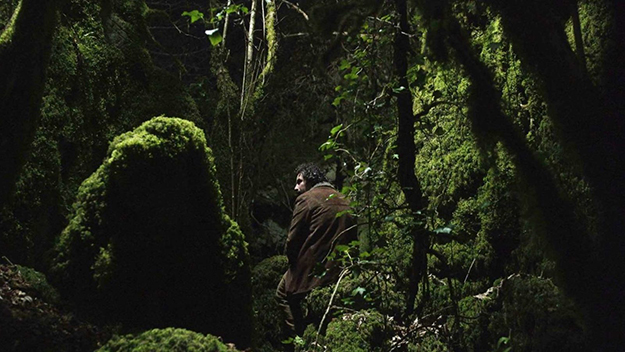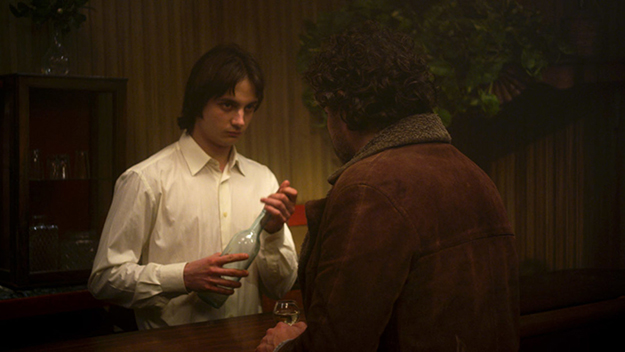Close Reading: Endless Night
The Critics Academy, a program of Film at Lincoln Center and a venture of Film Comment, is a workshop for aspiring film writers, providing a valuable platform to launch their careers. Throughout the 57th New York Film Festival, Film Comment will be publishing work from young critics taking part in the program.

Endless Night (Eloy Enciso, 2019)
When Endless Night (Longa noite) reaches the final panel of its triptych, it descends, as promised, into the liminal darkness of a forest at twilight. Or perhaps it’s dawn—throughout the sequence, it’s never clear whether the light is coming or going. It’s also unclear whether our solitary guide, Anxo (played by visual artist Misha Bies Golas), is seeking someone or being sought. Some years have passed since the end of the Spanish Civil War, and the former fighter in the Republican army has returned to his hometown in Galicia without injury, and without notice. After speaking with locals (in the film’s first two sections), Anxo now ventures into the tangled woods on the edge of town as if making a pilgrimage. Yet when the disembodied voices of political prisoners from the war begin to echo through the trees, it becomes increasingly clear he isn’t compelled on his journey by faith or duty, but by fear.
Like moss on ancient branches, this fear hangs off every frame of Endless Night, a meditative film that explores the posguerra (postwar) mood of Spain under the dictatorship of Francisco Franco and that screened in this year’s NYFF Projections program. In crafting his script, Galician filmmaker Eloy Enciso turned to diaries, essays, and letters of writers from the period to provide the texture and true-to-life testimonies that ground the film. This script follows Anxo as he returns home, speaks with the likes of grieving mothers, struggling businessmen, and Franco’s supporters, and eventually travels into the woods beyond the city. The film’s materialist approach, which evokes the works of Straub-Huillet, builds upon this series of near-vignettes—brief portraits of Spanish civilians reflecting on their lives before, during, and after the war, connected only by Anxo’s journey and the unshakable weight of fascism.
In the film’s finale, these portraits shift from firsthand accounts delivered by the non-actors on-screen to letters from captivity read aloud by an offscreen narrator as Anxo clambers through the woods. Some of the letters are quotidian, their authors explaining what they had eaten that day and wishing their children well. Others are more unnerving, describing the violence and hopelessness of life in prison. “How true it is when they say that a prisoner is a living being that is dead,” one writes. By separating these final accounts from the physical forms of those who once delivered them, Enciso removes the temporal boundaries of each story, granting them a more universal significance and suggesting their tragedy may cycle on indefinitely. Preserved in the Galician landscape, stories like these—like the insidious pro-fascist sentiments that bore them—will persist long after every witness to this war is gone.

This sequence’s text doesn’t carry the burden of its historical vision alone. Through the lens of Mauro Herce—the Galician cinematographer also behind Fire Will Come (O que arde), which played in this year’s NYFF Main Slate—the final act of Endless Night is a dreamlike journey to a place where time doesn’t seem to exist. The rigid shot–reverse shot editing of the film’s first sections now abandoned, the camera glides along in Anxo’s wake as he sinks deeper into the darkness of the woods. Faces have been replaced by rocks, branches, and leaves, the outlines of each confused by shadows. The dim light creates invisible monsters lurking around every corner. Wolves cry out in the distance. We see Anxo’s hands pick berries off a bush, then glide along rough bark, and brush a stone with deep crags and age lines. Anxo moves on, but the camera remains fixed on the stone. How long has it been here? How long will it remain?
This stone evokes imagery from “Longa noite de pedra” (“Long Night of Stone”), the poem that inspired Endless Night and provided its title. The 1962 work by Celso E. Ferreiro, which describes the suffering of Galicians under Franco, makes its presence felt in almost every corner of the film—its “stone” is literalized here in the woods, as well as in the hands of the foreman building a police station in the film’s first chapter. But more broadly, the burden of dictatorship described by Ferreiro is reflected in the flinty light and rigid composition through which Endless Night frames Galicia and its postwar inhabitants. The people Anxo encounters are, like the camera that captures them, always immobile, fixed in place as though weighed down by history. Every establishing shot of the countryside is almost entirely drained of color, an after-image of a once-vibrant landscape. The war has not only killed and suppressed its citizenry, but also fundamentally changed the very land that defines the region.
Though Endless Night is undoubtedly mournful, its final sequence begins to move beyond pessimism. Like Christian Petzold’s Transit, another 2019 work about cultural trauma and political upheaval, Enciso’s film folds together past and present to create a sense of real urgency about modern authoritarianism. Aside from the ham radio that Anxo carries with him through the woods, there is no indication of the time period throughout the final act, which easily allows us to project its events decades into the future. And like so many speeches delivered in the film, every letter that is read aloud over this sequence relates the universal cruelty of poverty, imprisonment, and political oppression. The timelessness of Endless Night is double-sided—it paints fascism as a cyclical force that might never be truly defeated, while also encouraging us to take hold of the historical knowledge at our disposal and prevent the pattern from repeating in our lifetimes. As Anxo heads toward his uncertain fate, the camera follows, occasionally faltering, as if hesitantly seeking an escape at last.
Cassidy Olsen is a Boston-based freelance film writer and the print editor at Much Ado About Cinema.







